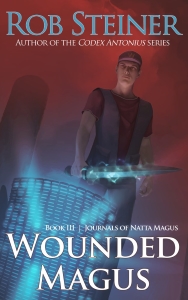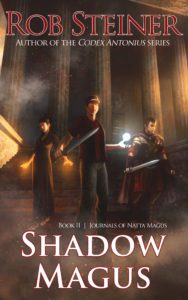 Well met!
Well met!
No question that life was hard in ancient Rome. Especially for Natta Magus, that time-traveling wizard from an alternate 21st century where magic is real.
In the all new WOUNDED MAGUS, book three in the Journals of Natta Magus series, Natta graduates from saving Rome to saving the world.
Here’s the blurb:
Natta Magus watched Helva, the granddaughter of Cleopatra, literally leap into hell to save him and Augustan Rome from annihilation.
The least he could do was bust her out. His twenty-first century honor would accept nothing less.
So along with Cana, a slave-turned-magi apprentice, and Paetus, his self-appointed chronicler, Natta sets off for Alexandria, Egypt, where he hopes to find a way into the Egyptian underworld to rescue Helva.
But his ship is attacked and sunk along the North African coast, bringing him face-to-face with a former adversary who has somehow gone from every day, first-century human to magical demigod. And not only that, the adversary wants Natta’s help in bringing about a magical apocalypse that will change the world and the history he knows.
Natta has to fight his way through pirates, daemonic hordes, and his own dark temptations to not only stop the apocalypse, but save Helva from the Torture Goddess herself.
Just another day for him in the Roman Empire.
WOUNDED MAGUS is available on Amazon Kindle for $4.99, and in trade paperback for $12.99.
Need to get caught up? Read CITIZEN MAGUSÂ and SHADOW MAGUS, the first two books in the Journals of Natta Magus.
Check out the first chapter of WOUNDED MAGUS below.
And remember: Semper ubi sub ubi!
WOUNDED MAGUS:
Chapter One
I awoke to darkness and the sounds of lapping water. The smells of moldy wood, old sweat, fish, and the sea all mingled into a miasma every bit as potent as Rome’s. After a disorienting moment, I remembered where I was: on a sea galley crossing the Mediterranean to Carthage.
The darkness wasn’t absolute. Cana had set a dim spark globe above us before we had gone to sleep. We were in the captain’s “cabin,†which was about the size of my apartment’s closet back home in twenty-first century Detroit. Cana lay on the cot, and there was barely enough room for Paetus and me to lie curled up on the floor next to her. It was my letters of credit from Caesar Augustus himself that had earned Cana, Paetus, and I the best sleeping spot in the galley.
But none of that had awoken me. It was the muffled cries of alarm from above us, followed by thumps of bodies falling to the deck. If there had been rousing bouts of laughter, I would’ve chalked it up to drunken sailors and gone back to sleep. But it was the ensuing silence that kept me awake.
Our galley was under attack.
Out of all the travel methods in the ancient Roman world, boat travel always seemed the most dangerous to me.
No, Natta Magus, you’re from the future, Paetus and Cana had said, for once in agreement on something. It is the best way to get to Egypt. It would take weeks to travel the roads through Anatolia and Palestine. You’re too used to your aero-planes and horseless trollies, Natta Magus. Trust us, Natta Magus, this way is best.
The four-day crossing from Sicily to North Africa was a nightmare. We encountered monstrous swells that almost toppled our galley and made me yack up the meager porridge they served onboard. The hull leaked in six different spots, which required slaves armed with buckets to monitor them round the clock. And then there was the whole day without a breath of wind to move our sails. It made me wonder what it would be like to die of thirst on a salty sea. And this was only the first half of our journey. Once we reached Carthage, we’d board another galley that would hug the North African coast and take us straight to Alexandria.
All part of a normal voyage, the Carthaginian captain explained. Nothing to worry about.
I’m not an “I told you so” kind of guy. When I realized the ship was under attack, I simply nudged Cana on her cot. My apprentice’s brown eyes shot open.
“Don’t panic, leerling,” I whispered, calling her the Dutch word for apprentice. “We’re under attack.”
She opened her mouth to say something, but Paetus shot up into a sitting position next to me. “Attack? Are you—?”
Both Cana and I shushed him at the same time. The whites of his eyes were almost as bright as the spark globe above us.
A man screamed on the deck, and we all jumped. Heavy feet creaked and bent the floorboards above our heads. We stared at the ceiling in silence. Then came a thump and the sounds of many feet rushing across the deck.
“We should help,” Cana said, still watching the ceiling.
“Are you mad?” Paetus hissed. “It’s probably pirates. They’re monsters. I’ve heard horrid tales. They’ll slice us open from neck to groin and let the gulls feast on our innards!”
Cana rolled her eyes and whispered, “Piracy has been extinct for decades. You read far too many fantastical tales.” Her tone was impatient as it always was with Paetus, but her Latin’s Gallic accent was far more pronounced. It meant she was scared.
Paetus’s wan face turned pink with anger. “Just because Pompey Maximus destroyed them doesn’t mean he made them ‘extinct’. They could still lurk in every cove and—”
“Paetus,” I said. I kept my voice low, calm, and firm like a leader should. “Whoever they are, Cana’s right. We either do something now or wait for them to find us.”
Paetus groaned.
“I have practiced slapen,†Cana said. “I can get at least four.”
More likely one, I thought. Cana had a habit of overestimating her strength. But what she lacked in strength—at the moment—she more than made up for in confidence and shear stubbornness to learn. She’d grown more in the last two months that I’d known her than I had in all four years of secondary academy in Detroit. I never believed that magi of her strength could naturally develop so early before the Great Awakening. She’d surpass my strength in the next few years.
If we made it through the next five minutes.
“Only if they’re kind enough to bunch up for you,” I said to her, “and if none of the crew are among them to dissipate the spell. If so, go for it. If not, we need another plan.”
A shout came from above in a language that certainly wasn’t Latin. It sounded similar to the Carthaginian captain’s words when he gave orders to his crew and slaves. The freedmen rowers just outside the cabin’s thin curtain murmured nervously in their rowing bays.
“Paetus,†I said, “do you understand what they’re saying up top?”
Paetus knew about a dozen languages, Carthaginian Punic being among them. He looked sick with fear, but he cocked his head and listened. His shoulders slumped and he looked even sicker, if that was possible.
“They just killed the captain,” he whispered. “The pirate leader told his men to search the rest of the boat.”
My throat seized up and my bowels cramped. I wasn’t surprised by my physical reaction to danger. I’d been in many life-and-death scrapes during my three years in Augustan Rome, versus zero in my twenty-first century life. I’ve fought vampire-like monsters called strix, a sewer basilisk that almost killed Augustus himself, ghosts, daemons, and, most recently, the magically conjured avatar of the Roman revenge goddess Invidia. You’d think I’d laugh off a few mundane pirates.
But this was how I always felt before a fight, from a brawl with drunken Roman plebs to an arena-destroying battle with a deity. And somehow I’d survived all those. I had a destiny, supposedly, and it wasn’t to die here.
“Cana,” I said, my voice level, “grab all your spell components. We may not be coming back here. Paetus, take only the scrolls and bags you need. Leave your trunk.”
Cana was already cinching her leather components pouch before I’d finished my order.
Paetus gave a shaky sigh and then gathered the scrolls on which he’d been writing before we went to sleep and stuffed them into his shoulder bag. He eyed his trunk, filled with even more scrolls, books, and clay tablets, and sighed again.
I made sure my trusty old Wolverines baseball cap was firmly set on my head, secured my own components vest, and fastened my gladius belt around my waist. I also slung my watertight leather bag, which contained Augustus’s letters of credit, over my shoulders. I sealed the scroll tubes with these journals you’re reading and the cherubic statue of my dearly departed house spirit Lares. I left behind my other sacks with a change of clothes.
I glanced at the wrists of both Cana and Paetus. They both wore the enchanted leather bracelets that I’d given them. I reached out with my cell magic and could feel my feet wanting to walk toward them. As long as they wore those, I could find them if we got separated.
“Think you can swing a blussen?” I asked Cana.
“Yes but how will we see?”
“Use cell magic to filter your eyes to heat. You’ll see them, but they won’t see you.”
She nodded, then gave me a worried look. “What are you going to do? Are you going to use—?”
“No,” I said firmly.
“I can stop you if you lose control. I know the words—”
“I said no!”
Things weren’t that desperate for me to give up a bit of my soul. Yet.
A girl’s scream came from the cabin across the hull from us, and then a young man’s angry shouts. There were two Carthaginian girls in that cabin, one eleven and one sixteen, traveling with their brother who wasn’t much older than them. The brother was yelling something in Punic. The other girl was screaming now, and the harsh laughter of the pirates finally got me moving.
“Put out the spark globe and cast the blussen!” I hissed to Cana.
I turned my Wolverines baseball cap around so that the bill faced backwards and flung the curtain aside.
Continue reading on:
 Well met!
Well met!